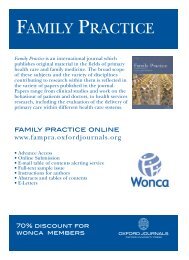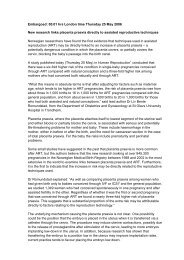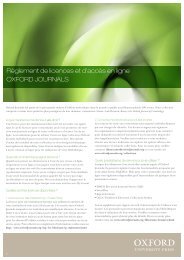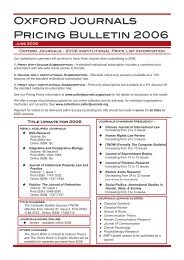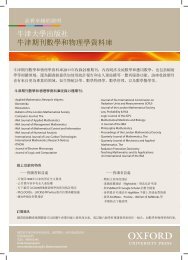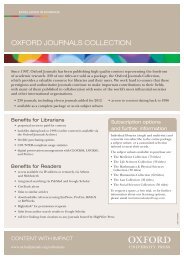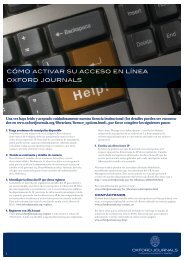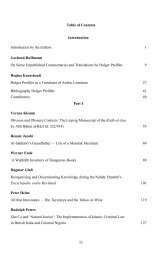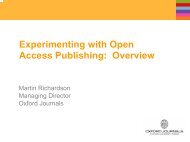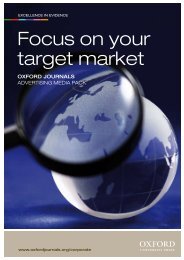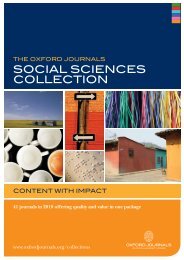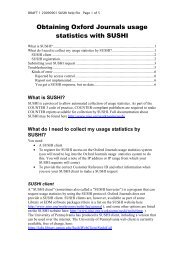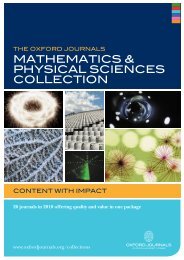Download the ESMO 2012 Abstract Book - Oxford Journals
Download the ESMO 2012 Abstract Book - Oxford Journals
Download the ESMO 2012 Abstract Book - Oxford Journals
You also want an ePaper? Increase the reach of your titles
YUMPU automatically turns print PDFs into web optimized ePapers that Google loves.
Annals of Oncology<br />
(ORR) and secondary endpoints were toxicities, disease control rate (DCR),<br />
progression free survival (PFS), and overall survival (OS). The planed sample size<br />
was 26 pts.<br />
Results: From March 2010 to May <strong>2012</strong>, 20 pts were enrolled and eligible: males/<br />
females 10/10; median age 66 (range 59-75); PS 0/2 2/18; stage III/IV 1/19; adeno/<br />
o<strong>the</strong>rs 20/0. Nineteen pts were eligible for efficacy and toxicity; a total of 226 cycles<br />
(median 12 cycles, range 1-27) was given. Major grade 3/4 toxicities were<br />
neutropenia, leucopenia, liver dysfunction and infection, respectively. There was no<br />
treatment-related death. ORR was 68.8%, and DCR was 100%. Median PFS is 18.2<br />
months and median OS is not reached.<br />
Conclusions: This combination showed longer median PFS and acceptable toxicity.<br />
Randomized trial of PEM + G compare with G alone is warranted.<br />
Disclosure: All authors have declared no conflicts of interest.<br />
1259P GEFITINIB FOR NON-SMALL CELL LUNG CANCER (NSCLC)<br />
WITH MINOR EGFR MUTATIONS: A RETROSPECTIVE STUDY<br />
FROM THE NORTH EAST JAPAN STUDY GROUP (NEJ)<br />
S. Watanabe 1 , H. Yoshizawa 1 , M. Maemondo 2 , A. Inoue 3 , S. Sugawara 4 ,<br />
H. Isobe 5 , M. Harada 6 , Y. Ishii 7 , K. Hagiwara 8 , K. Kobayashi 9<br />
1 Bioscience Madecal Research Center, Niigata University Medical and Dental<br />
Hospital, Niigata-City, JAPAN, 2 Department of Respiratory Medicine, Miyagi<br />
Cancer Center, Natori, JAPAN, 3 Department of Respiratory Medicine, Tohoku<br />
University, Sendai, JAPAN, 4 Department of Respiratory Medicine, Sendai Kousei<br />
Hospital, Sendai, JAPAN, 5 Clinical Oncology, KKR Sapporo Medical Center,<br />
Sapporo, JAPAN, 6 Department of Pulmonary Disease, National Hospital<br />
Organization Hokkaido Cancer Center, Sapporo, JAPAN, 7 Department of<br />
Pulmonary Medicine and Clinical Immunology, Dokkyo Medical University School<br />
of Medicine, Mibu, JAPAN, 8 Department of Respiratory Medicine, Saitama<br />
Medical University, Saitama, JAPAN, 9 Respiratory Medicine, Saitama<br />
International Medical Center, Saitama, JAPAN<br />
Background: In NSCLC, <strong>the</strong> sensitive mutations of epidermal growth factor receptor<br />
(EGFR), such as exon 19 deletion and L858R point mutation, are predictors of<br />
response to EGFR tyrosine kinase inhibitors (TKIs). However, it is still uncertain<br />
whe<strong>the</strong>r minor EGFR mutations are associated with sensitivity to EGFR-TKIs.<br />
Materials and methods: Retrospective review of 221 EGFR mutated (exon 19<br />
deletion, L858R, G719X and L861Q) patients who were treated with gefitinib in a<br />
NEJ002 study was performed. We identified 7 patients with G719X and 3 patients<br />
with L861Q.<br />
Results: Among 10 patients harboring minor EGFR mutations (G719X or L861Q), 5<br />
patients were treated with gefitinib as <strong>the</strong> 1st line treatment, and 5 patients were<br />
treated with carboplatin/paclitaxel as <strong>the</strong> 1st line chemo<strong>the</strong>rapy, and <strong>the</strong>n received<br />
gefitinib as <strong>the</strong> 2nd line treatment. Only 2 patients showed PR, 4 achieved SD, and 4<br />
had PD with gefitinib treatment. The overall response rate was 20% and <strong>the</strong> disease<br />
control rate was 60%. The overall survival (OS) from enrollment was significantly<br />
shorter in patients with minor mutations (median OS, 12 months (95% CI, 5.8 -<br />
30.5)) compared to patients with 19 deletion or L858R (median OS, 28 months (95%<br />
CI, 24.1 – 33.2), P = 0.0057). Tendency of longer progression free survival and OS<br />
were observed in minor EGFR mutation patients who received carboplatin/paclitaxel<br />
as <strong>the</strong> 1st line treatment (median PFS, 5.3 months (95% CI, 3.7 – 8.9) and median<br />
OS, 22.8 months (95% CI, 9.9 – 41.8)) compared to those who were treated with<br />
gefitinib as <strong>the</strong> 1st line treatment (median PFS, 2.2 months (95% CI, 0.5 – 10.6), P =<br />
0.997 and median OS, 11.9 months (95% CI, 5.8 – 22.6), P = 0.1021).<br />
Conclusions: Our results indicate that NSCLC patients with G719X or L861Q minor<br />
EGFR mutations are less responsive to gefitinib than those with 19 deletion or<br />
L858R.<br />
Disclosure: All authors have declared no conflicts of interest.<br />
1260P A PHASE II STUDY OF ERLOTINIB AS FIRST-LINE<br />
TREATMENT IN JAPANESE ADVANCED NSCLC PATIENTS<br />
HARBORING EGFR MUTATIONS<br />
A. Horiike 1 , M. Nishio 1 , K. Goto 2 , N. Yamamoto 3 , K. Chikamori 4 ,<br />
M. Maemondo 5 , T. Hida 6 , N. Katakami 7 , T. Tamura 3<br />
1 Thoracic Oncology Center, The Cancer Institute Hospital of Japanese<br />
Foundation for Cancer Research, Koto-ku, Tokyo, JAPAN, 2 Division of Thoracic<br />
Oncology, National Cancer Center Hospital East, Kashiwa, JAPAN, 3 Division of<br />
Internal Medicine and Thoracic Oncology, National Cancer Center Hospital,<br />
Chuo-ku, Tokyo, JAPAN, 4 Oncology Medicine, National Hospital Organization,<br />
Yamaguchi - Ube Medical Center, Ube, JAPAN, 5 Department of Respiratory<br />
Medicine, Miyagi Cancer Center, Natori, JAPAN, 6 Department of Thoracic<br />
Oncology, Aichi Cancer Center Hospital, Nagoya, JAPAN, 7 Integrated Oncology,<br />
Institute of Biomedical Research and Innovation Hospital, Kobe, JAPAN<br />
Background: Several studies of EGFR TKIs have shown a benefit in response and<br />
progression-free survival (PFS) for NSCLC patients harboring EGFR mutations in<br />
<strong>the</strong> first-line setting. This is <strong>the</strong> first prospective study to investigate erlotinib for <strong>the</strong><br />
first-line treatment of NSCLC patients harboring EGFR mutations in Japanese<br />
patients.<br />
Methods: We undertook <strong>the</strong> single-arm phase II study at 25 centers. Eligible patients<br />
were adults (over 20 years) with advanced or recurrent NSCLC harboring EGFR<br />
mutations (Exon 19 deletions (19del) or Exon 21 L858R mutation) with no prior<br />
chemo<strong>the</strong>rapy for NSCLC. The primary endpoint was progression-free survival (PFS)<br />
and safety. Secondary endpoints were overall response rate (ORR), disease control<br />
rate (DCR), overall survival (OS), and response duration.<br />
Results: Between April 8 and October 6 2010, 103 patients were enrolled. All<br />
patients were administered erlotinib and included in <strong>the</strong> safety analysis. One<br />
patient was excluded from efficacy analysis, because of <strong>the</strong> deviation of GCP. Thus<br />
102 patients were analyzed in <strong>the</strong> efficacy analysis. At Data cut-off (Sep 1, 2011),<br />
median PFS assessed by Independent Review Committee was 11.8 months [95 %<br />
CI 9.7- not reached]. The updated median PFS incorporated with follow up<br />
assessments will be obtained in August <strong>2012</strong>. The most common adverse events<br />
were rash and diarrhea in 82.5 % and 80.6 % respectively, with Grade 3 was 13.6<br />
% and 1.0 % respectively, and <strong>the</strong>re were no Grade 4/5 rash and diarrhea. Six<br />
treatment-related ILD like events were reported by investigators, and of which two<br />
were fatal. ORR was 78.4 %, DCR was 95.1 %, and response duration was 11.1<br />
months [95 %CI 9.4- not reached], OS data is immature at this time (only ten<br />
deaths events). Median PFS in 50 patients with 19del was 12.5 months, in 50<br />
patients with L858R was 11.0 months, and two patients with L858R/T790M was<br />
3.8months.<br />
Conclusion: This study showed a promising efficacy and safety profile of erlotinib in<br />
Japanese advanced NSCLC patients harboring EGFR mutations.<br />
Disclosure: A. Horiike: Corprate-sponsored research: Chugai, Pfizer, Merck,<br />
KyowaKirin, Taiho, Eisai, Novartis, AMGEN. M. Nishio: Corporate-sponsored<br />
research: Chugai, Eli Lillly, Pfizer, DiichiSankyo, KyowaKirin, Taiho, Eisai, Novartis.<br />
Lecture fees: Chugai. K. Goto: Corporate-sponsored research: Chugai, Pfizer,<br />
KyowaKirin, Taiho, Eisai, Merckserono, Boehringer Ingelheim Lecture fees: Chugai,<br />
Taiho, Ono. N. Yamamoto: Corporate-sponsored research: Chugai, Pfizer,<br />
KyowaKirin. K. Chikamori: Corporate-sponsored research: Chugai, Taiho, Nippon<br />
Kayaku Lecture fees: Eli Lilly. M. Maemondo: Corporate-sponsored research: Chugai,<br />
Taiho, Janssen Lecture fees: Chugai, Eli Lilly. T. Hida: Corporate-sponsored research:<br />
Chugai, Eli Lilly, Bayer, Pfizer, DaiichiSankyo, KyowaKirin, Taiho, Boehringer<br />
Ingelheim, Merck, Aventis. N. Katakami: Corporate-sponsored research: Chugai,<br />
Pfizer, Kyowakirin, Ono, Janssen, Merckserono, Boehringer Ingelheim,<br />
Dainipponsumitomo, Eisai, Shionogi. T. Tamura: Corporate-sponsored research:<br />
Chugai, DaiichiSankyo, Boehringer Ingelheim, Abbott, Eisai, Bristol-Myers Squib,<br />
KyowaKirin Lecture fees: Taiho, Eli Lilly, Chugai<br />
1261P ERLOTINIB AS NEOADJUVANT TREATMENT IN PATIENTS<br />
WITH IIIA-N2 NON-SMALL CELL LUNG CANCER(NSCLC)<br />
WITH ACTIVATING EPIDERMAL GROWTH FACTOR<br />
RECEPTOR (EGFR) MUTATION (NCT01217619, ESTERN)<br />
B. Han, L. Xiong, R. Li, J. Sun, Y. Lou, Y. Zhang<br />
Department of Pulmonary Medicine, Shanghai Chest Hospital affiliated to<br />
Shanghai Jiaotong University, Shanghai, CHINA<br />
Background: Patients with stage IIIA N2 NSCLC have poor outcomes with 5-year<br />
survival rate of approximately 15% after treatment with surgical resection or<br />
chemo-radio<strong>the</strong>rapy. Tyrosine kinase inhibitor mono<strong>the</strong>rapy have been demonstrated<br />
a significant improvement in tumor response rate and progression free survival as <strong>the</strong><br />
first line treatment for metastatic NSCLC patients with activating EGFR mutation.<br />
The objective of this trial is to explore <strong>the</strong> efficacy and safety profile of erlotinib as<br />
neoadjuvant treatment in patients of stage IIIA-N2 NSCLC with activating EGFR<br />
mutation.<br />
Material and methods: This is a single arm, one center, phase II study of erlotinib<br />
as neoadjuvant treatment in patients with Endobronchial Ultrasound (EBUS)<br />
confirmed stage IIIA-N2 NSCLC with activating EGFR mutation in exon 19 or 21.<br />
The primary endpoint is to evaluate radical resection rate. A total of 44 patients will<br />
be enrolled. Major inclusion criteria: IIIA-N2 NSCLC Patients with pathologically<br />
confirmed ipsilateral mediastinal metastasis by EBUS. The biopsy specimen shows<br />
activating EGFR mutation in exon 19 or 21.<br />
Treatment schedule: All <strong>the</strong> recruitment patients will be treated by erlotinib 150mg<br />
orally per day for 56 days for neoadjuvant period. Patients will be assessed by Chest<br />
CT for <strong>the</strong> efficacy evaluation in day 29 and right after day 56. All <strong>the</strong> post-operative<br />
patients will receive standard adjuvant treatment which will be decided by <strong>the</strong><br />
investigator.<br />
Current enrollment: 48 patients have been screened, and 7 patients met <strong>the</strong><br />
inclusion criteria and were enrolled. 2 patients are still on neoadjuvant treatment, 5<br />
patients have completed <strong>the</strong> neoadjuvant <strong>the</strong>rapy, and RECIST evaluation showed<br />
partial response in 2 patients, disease progression in 2 patients, and disease stable in<br />
1 patient. Due to active hepatitis and technical infeasibility, 2 patients with PR didn’t<br />
receive surgery, only one SD patient received R0 surgery.<br />
Disclosure: All authors have declared no conflicts of interest.<br />
Volume 23 | Supplement 9 | September <strong>2012</strong> doi:10.1093/annonc/mds409 | ix413



